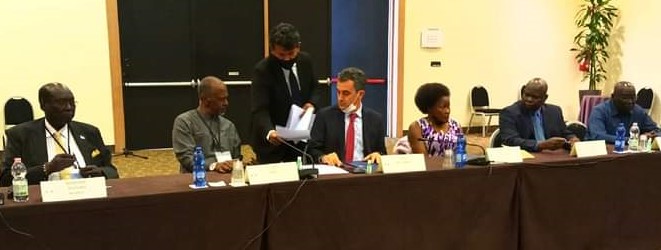South Sudan reiterates commitment to Rome talks
November 9, 2023 (JUBA) – The South Sudanese government has reiterated its commitment to the peace process mediated by the Rome-based Sant’Egidio community, citing several responses to invitations for talks with the hold-out groups.
The minister for Presidential Affairs, Barnaba Marial Benjamin told Sudan Tribune on Thursday that the government remains committed to the Rome peace process, despite divergence in the approach to harmonize opinions and views on fundamental issues.
“Nothing has changed in the pursuit of peace and stability in this country. It is the vision of his excellency the President to resolve all issues through peaceful dialogue and it is in this context the door of peace and dialogue remains open”, he remarked.
The minister did not, however, disclosed when the peace talks in Rome would resume.
The Transitional Government of National Unity and the holdout opposition groups, now operating under the banner of Non-Signatories South Sudanese Opposition Group (NSSSOG), have been holding talks being facilitated by Community Sant ’Egidio, a worldwide movement of people who stand together in solidarity to encourage dialogue.
The non-armed opposition groups who declined to sign the 2018 revitalized agreement are in talks wiht government to find ways of addressing the root causes of the conflict.
The Secretary-General of the Community of Sant’Egidio, Paulo Impagliazzo was quoted saying that peace talks between the two sides have stalled and may resume once the parties have agreed on the way forward.
“The situation is still the same and we are in discussions with both the government and non-signatories opposition groups to find common ground to restart the negotiations,” he said. “The situation is still the same and the non-signatories are asking for round table discussions and the government is asking to continue with the Rome Initiative as it is. So, there are no possibilities now for a common agenda to be discussed,” he said.
Impagliazzo affirmed that the government was determined to continue with political talks as per the Rome Initiative despite insistence on round table discussions by the group.
“We are in discussions with both the government and non-signatories to resume talks and we believe political negotiations are still the way to continue with,” he stressed.
The official did not disclose when peace talks between the two sides would resume.
Talks between the two sides collapsed in November 2022, after failing to reach a consensus. The parties traded accusations in which each attempted to portray the other as having no interest and only used delaying tactics to frustrate the efforts of the mediation team. The government accused the opposition of lacking the commitment to pursue peace negotiations and preparing for war while the opposition countered it with accusations that the government was only using delaying tactics to frustrate and trying to weaken them with dividing strategies to dismantle the process in its favour.
The South Sudanese leader nonetheless reiterated his commitment to the peace process with the group during the visit of Pope Francis to Juba in February 2023. He said negotiation would resume without condition. In March, talks resumed without success. Observers have pointed out the lack of seriousness of the parties since talks began in 2019, despite signing a ceasefire in January 2020.
Initially founded as the holdout group of three major groups, it grew in size and scope as a result of splitting and forming of own movement and structure. It now operates under the banner of the non-signatory South Sudan opposition group, an alliance bringing together United Democratic Revolutionary Movement/Army UDRM/A, National Democratic Movement Patriotic Front (NDM-PF), National Salvation Front (NAS), South Sudan United Front/Army (SSUF/A), Sudan National Movement for Change (SSNMC), and the Real SPLM. The majority of the groups are predominantly outfits operated by activists in the diaspora aspiring for changes in South Sudan.
United in opposition and desire for the removal of the government of President Salva Kiir, their objectives and visions are diverse. Some are looking for opportunities in the government. Others have individual grudges and personal grievances either against Kiir or individuals within his administration.
(ST)

